Come from Away: Heartwarming hit show lands in Adelaide
The hit musical about the small Canadian town that opened its hearts and homes to stranded travellers in the wake of the 9/11 attacks, Come From Away, finally lands in Adelaide.
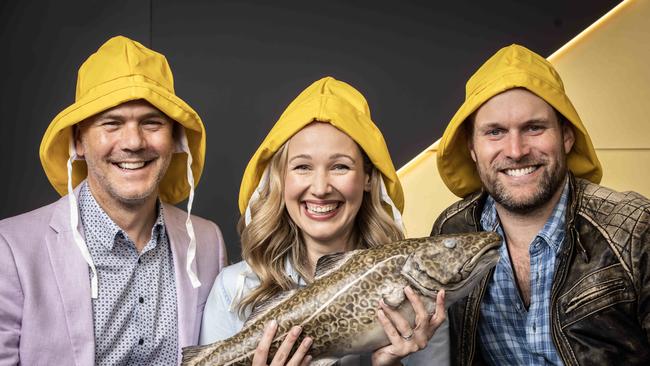
SA Weekend
Don't miss out on the headlines from SA Weekend. Followed categories will be added to My News.
It’s the little show that could, about the town that did.
The idea that the events which unfolded after terrorists hit America on September 11 could be turned into a musical is difficult to comprehend.
Until you hear about the Canadian community of Gander.
On 9/11, as America shut down its airspace, 38 planes were diverted to the tiny town of Gander, Newfoundland, which had a population just shy of 9000.
What it also had was a gigantic, international-standard airport built in 1936 to send allied aircraft to Europe, and to stage anti-submarine patrols in World War II.

With four runways, it was the largest airport in the world at the time.
It became a Transatlantic refuelling stop where everyone from late Queen Elizabeth II, and The Beatles to Muhammad Ali and Fidel Castro dropped in briefly, until jet engines with longer range were invented in the 1960s.
Then the world forgot about Gander until 2001. Fortunately Gander was still right there, waiting for the world.

In mere hours the population virtually doubled as the mayor, Claude Elliot, and his community worked around the clock to house, feed (with some 285,000 meals) and care for the stranded strangers, they dubbed – as they do for any blow-ins – “come from aways”.
Canadian husband and wife creative team David Hein and Irene Sankoff turned the heartwarming stories of the community who received the stranded passengers – initially only meant to be there for just a few hours, but instead remained for five days – into Come From Away.
The musical has toured the world since 2015, garnering accolades and awards from Tonys to Oliviers.
It finally lands in Adelaide this week, after enduring multiple Covid shutdowns.
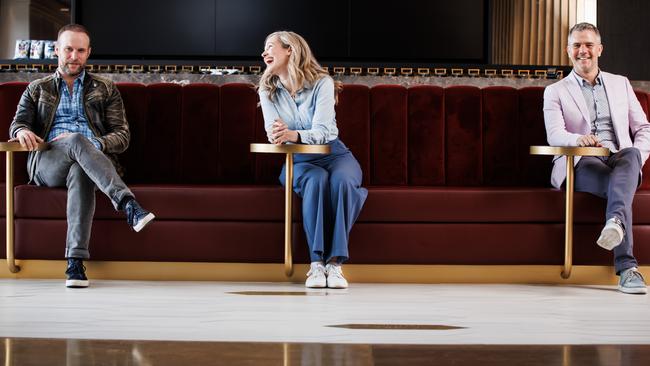
Hein laughs, as he Zooms in from his New York apartment, that they never, not even in their wildest dreams, imagined their creation – for which they wrote the music, lyrics and book – would traverse the globe, with extended seasons on Broadway and the West End.
“When we first wrote it, we imagined that Canadian high school students would be forced to do this show,” he says, after apologising that Sankoff was unable to join us, ironically because she was stuck on a plane, delayed by an ice storm.
“We thought it would be historical and there would be lots of parts for all of the kids. We had no idea where it would go.”
What they did know was that the story reminded them of their own experiences in the days after 9/11.
Hein and Sankoff were students living in New York.
His cousin was in the World Trade Center towers – fortunately she escaped, but it was many long, and immensely stressful, hours before they had that confirmed as mobile networks failed to cope with the sheer volume of calls.
There were some 110 different countries represented in the student residence in which they were living.
“So it was this community around the world taking care of us,” Hein recalls. “Our neighbours came knocking on our door to see if we were OK. Musicians in the building would play music. And we all came together to try to, you know, get through this.
“And so when we heard the story of Gander, it was very familiar to us. All of these people who were scared, and angry, and confused at the time coming together from around the world.
“Their story also reminded us that there were good people in the world.
“It made us proud as Canadians, but it also made us just proud as humans that people can be good to one another in response to a tragedy.”
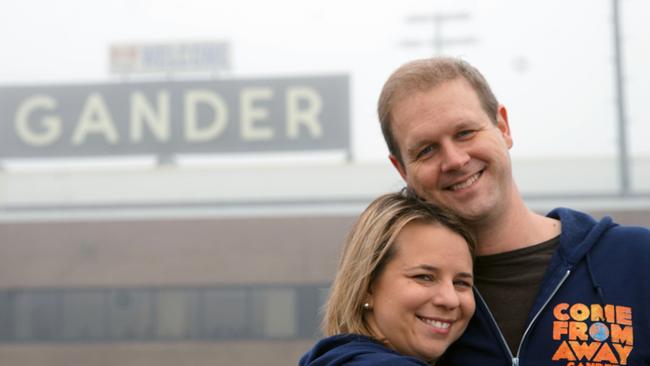
The couple travelled to Newfoundland and gathered not only stories, but lifelong friends.
“They’re all family to us now,” Hein explains.
“And so we wanted to do a show about our family. It was never about it travelling around the world.
“It’s the story that has brought it there. The generosity of these people is what has taken it around the world, including Australia.”
While some of the characters are composites of the hundreds of people Hein and Sankoff met and interviewed, others are the real deal such as the aforementioned Elliot who was the elected mayor of Gander from 1996 until recently.
Or Beulah Cooper – the treasurer of the ladies auxiliary for the Royal Canadian Legion – who welcomed streams of people for showers. She took people shopping for clothes and helped make food.
And Gander Academy French immersion teacher Diane Davis who was up for 72 hours straight helping the come from aways before being forced to rest.
And then there’s the romantic heart of the musical – Diane Kirschke and Nick Marson.
The pair met after he asked if she minded if he took the bed next to hers in the makeshift shelter in Gander.
Both single empty-nesters with grown children from previous relationships, they got talking, and walking and sharing in the island’s traditions including a “screeching-in” ceremony where visitors kiss fish to become honorary Newfoundlanders.
Sparks flew and they swiftly developed deep feelings in the chaos and enforced closeness of those five turbulent days.
They stayed in constant contact afterwards, fell in love in the real world and married almost a year later, honeymooning in Gander.
“They talk about being on the treadmill of life,” Hein says. “And for one brief second they were pulled off it for five days. And they met the love of their life and then had to decide whether to go back or jump at this. It’s also beautiful that they get to come to the show and commemorate their love.”
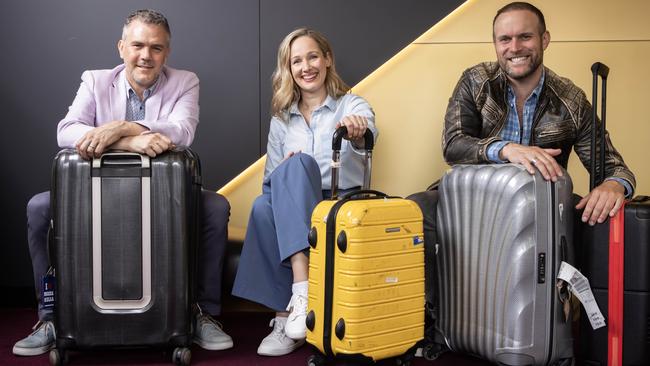
Cast members Phillip Lowe and Natalie O’Donnell play Nick and Diane as their main roles. (The show is an ensemble piece, with the cast of 12 playing several roles each – usually on both sides of the fence as a Newfoundlander and a come from away).
The pair go way back. Two decades, in fact, when they were in a Sydney Theatre Production of The Sunshine Club. They were last in Adelaide in 2018 for Mamma Mia.
Lowe says he’s not used to being the romantic lead.
“I’m usually the comic relief, you know,” he laughs, and while many of the cast have met their offstage counterparts, Lowe joined the cast after it was shut down the first time.
The slight twist in the romantic story – Lowe’s wife Zoe Gertz is also in the show as pilot Beverley Bass. The real-life Bass was the third female commercial airline pilot hired by American Airlines in 1976. And went on to be the very first female captain in 1986. So Lowe gets to kiss another woman in front of his wife eight times a week.
Gertz giggles as Lowe hurriedly explains it’s just par for the course now.
“Look I can’t speak for Zoe’s experience but she’s the first one to understand that there’s nothing romantic about stage kissing,” he explains. “You usually have sweat dripping down the side of the face. And you go in for a kiss and you miss each other’s mouths. So it’s like an awkward thing and I get Natalie’s makeup on my glasses.”
O’Donnell laughs at the incestuous nature of musical theatre.
“It’s that hilarious thing where Zoe’s worked with my husband Simon (Gleeson) before,” she says. “We just keep crossing over paths.
“But look, Zoe is just so gracious and allowed us all to have a big laugh about it early on, they’re both dear friends so it is hilarious.
“Only in musical theatre, right?
“My kids are hilarious about (me kissing another man) – they’re just so blase about it.”
Lowe (whose roots are very much South Australian, born in Jamestown and went to Thorndon – now Charles Campbell – High School) rather relates to his onstage alter-ego’s bold, life-changing, take-a-chance decision.
He took a rather less traditional route to realising his love of musical theatre. He’d had parts in school plays, but didn’t pursue it, thinking it wasn’t the “real deal”.
Instead, Lowe spent three years working for the Commonwealth Bank. Until his branch was held up and the armed robber held a shot gun to his head. It reaffirmed that life was way too short and, of course, never wanting to suffer that trauma ever again, he subsequently auditioned successfully for WAAPA.
Lowe met his next great love, Gertz, while auditioning for Dirty Rotten Scoundrels in 2017.
“We did our callback reading opposite each other and he tells the story that he was completely intimidated by me because I was all business,” Gertz shares.
“He’s a bit of a clown, whereas I get into audition mode. I’m like ‘Nah, I’m not here to laugh, not here to joke. I’m here to do work’. But on the inside I was like, ‘Oh my gosh, this is Phillip Lowe.’ I already knew who he was and his work and I was internally fangirling.
“But the impression he got was, ‘I have to be careful with this one. She’s tough.’”
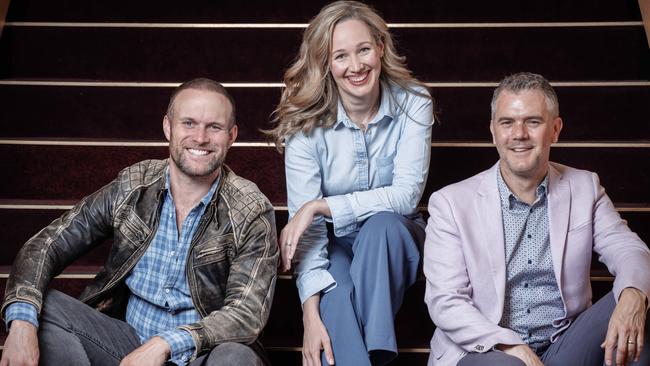
Lowe managed to crack that tough facade and they started dating after winning their respective roles in the show. Gertz also joined Lowe on Georgy Girl, and they toured and travelled the world, before getting engaged. They married in 2018 and honeymooned in the Clare Valley where they spent their days enjoying “the triumvirate” – Kitchener buns, pasties, and good old SA shiraz.
“We’re very blessed and it was good that we went overseas together,” Lowe says.
“We worked out reasonably early on that we could travel together very well.
“We manage to not get on each other’s nerves too much – even when sharing a tiny apartment.”
They ponder if it’s an advantage or disadvantage that onstage in this, their third show together, they have absolutely nothing to do with each other.
“So literally, we can get home at the end of the night and go ‘So, how was your day, dear?,’” Lowe says.
Gertz adds: “Which I think is good because if it were a situation where I was playing Diane and we’re actually having to work together eight shows a week, we probably would argue more because I’d be like, ‘What are you doing that for?’ ‘Stop spreading your makeup on me.’”
Just as Lowe and Gertz’s home and work life blends together, so too does Hein and Sankoff’s.
Is it just as smooth for the creatives?
“It’s always perfect,” Hein says, with a wry smile and a hint of sarcasm.
“No, seriously it’s wonderful. Raising a musical is like raising a kid. So sometimes you need the support of someone else.
“And even though it may sometimes be hard and you can be on different pages, the fact that you have someone next to you, who loves you and is aimed in the same direction as you and is holding your hand, you’re going to walk that path together.
“There’s nothing more valuable than that.”
Hein says they have raised their nine-year-old daughter with Come From Away as an almost sibling. “It’s a good lesson for us and for her that people can be good to one another and you can always find kindness,” he says.
“And that gives you hope in times of darkness. So we’ve brought it up time and time again with her. I hope it’s buried into her heart somewhere.”
They’ve also instilled their love of theatre in her. She certainly has a healthy appreciation of their wildly-successful and critically acclaimed show, but she did ask her parents – after recently watching Six, the smash-hit musical about the wives of Henry VIII – why didn’t they write that one?
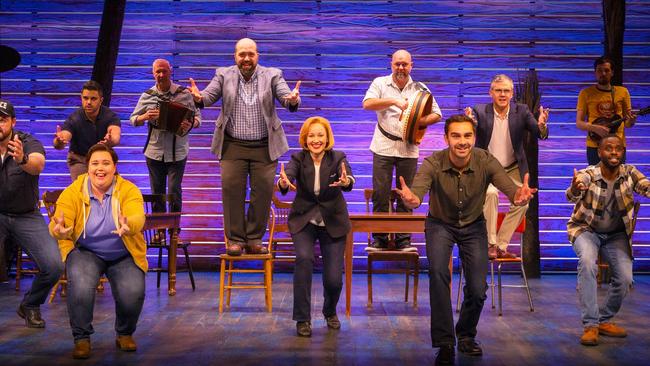
While Come From Away doesn’t have the stunning songs of Six, and nor do they play much of a role in helping to define the characters, what the music does do is beautifully underscore the action.
And it does this while also drawing on Newfoundland’s proud Celtic heritage.
Sitting in the opening night crowd in Sydney’s Theatre Royal last year, this journalist was captivated from the get-go by Come From Away’s ingenious blend of song, movement and storytelling.
It’s a beautiful piece of musical theatre that overwhelms you with emotion and connects the audience.
The set is sparse, largely constructed around the choreography of chairs, forming the planes. Or a bus journey from the airport can be depicted by the actor steering an imaginary wheel, while everyone just sways their torsos.
It’s 100 minutes, with no interval to interrupt the flow, and you can’t help but marvel at the ease with which the cast slips from American to British to the lyrical, but complicated, Newfoundland accent – a mix of Canadian and Irish, or “drunken Irish pirates” as a Newfoundlander explained to the original Broadway cast.
Doug Hansell, who’s been in the Australia version from the beginning and will have his 700th performance on Her Maj’s stage, says the fact the production itself is still going is also a marvel.
“We’re the only show (still going in Australia) that had a life before Covid,” he explains. “We’re the only show that survived Covid and continued on after the pandemic.
“So Come from Away is the little show that could, about the little town that did.”
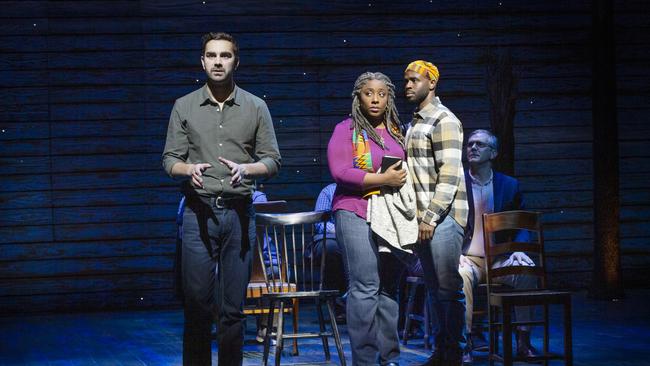
It was a fortuitous choice for the London-based, former Sydney boy, who was back home in Australia when producers were still looking to cast his main part as Kevin T – partner of Kevin J (both Kevins, really yes).
“Two days before I was going back to London, I got the call to say I got the gig.” Hansell recalls.
“And I had to make a frantic decision about whether to go back. My agent in London was like ‘Oh yeah, do it for 12 months and then come back here and do it.’”
That obviously didn’t happen.
Instead Covid did.
“One hundred per cent (it was a blessing) I said yes – if I hadn’t been in Australia during Covid, it would have been a very, very sorry state of affairs,” he says.
In the days leading up to the world shutting down, Hansell was teaching acting students in Melbourne.
“I remember saying to them ‘Observe everything you can about this moment, because 20 years ago when 9/11 happened, I would never have imagined that in 20 years’ time I would be in a show telling a story about 9/11,’” he says.
“But then, also the way I like to describe (Come From Away) is it’s not about 9/11, it’s 9/11 adjacent.
“I think that’s the reason the show works as well – because if it was a musical about the terrorist attacks, it would rightly flop and it would be crude. But because it doesn’t go to the heart of the tragedy, it goes to the outskirts of it, it’s OK.”
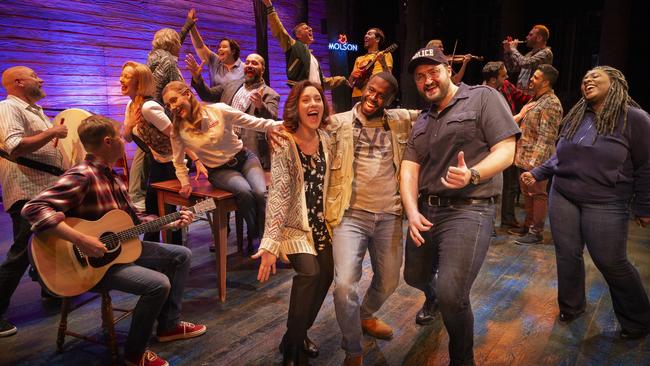
Hein agrees, adding that all along he and Sankoff didn’t want to write a 9/11 musical, rather a 9/12 musical.
“When you look at the script, we say the words World Trade Center once, we say the words terrorist once – it’s really about Newfoundland and how they respond,” he says.
“Unfortunately, there is tragedy, after tragedy that we see on our newsfeeds and our social media constantly. And so it feels like this show is a response that could happen at any day, at any time you’ve got kindness in you that you can use to respond to the dark.
“And I think, right now, coming out of a pandemic and needing community now more than ever, I think that’s why the story continues to be even more relevant.” ■


